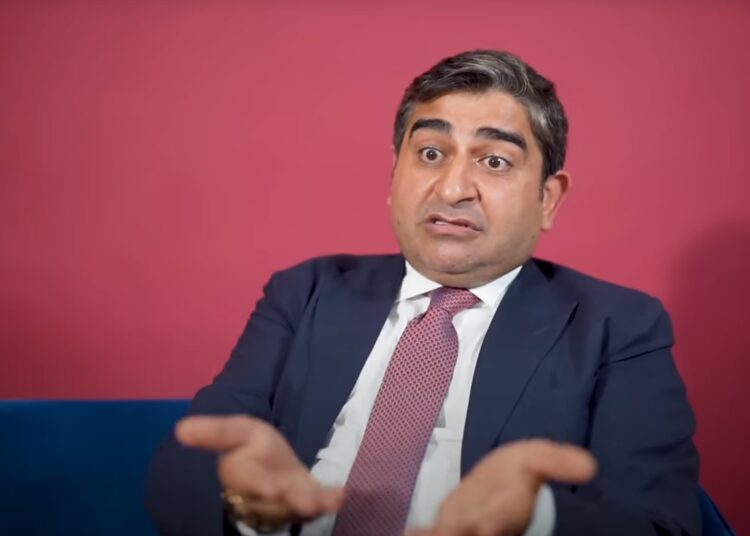Abdullah Bozkurt/Stockholm
Sezgin Baran Korkmaz, a Turkish national, indicted for defrauding US taxpayers of over $133 million, said he had dined, socialized and traveled with James Woolsey, the former CIA director and advisor to Donald Trump.
In a September 7 interview with Fatih Altaylı, a long-time asset of Turkish intelligence agency MIT posing as a journalist, Korkmaz recounted his introduction to the retired CIA director in Turkey, which led to business proposals, dining in luxury restaurants, traveling together by private jet and even home visits.
In April 2021 a grand jury in the District of Utah indicted Korkmaz on 12 counts, including money laundering conspiracy, wire fraud and obstruction of an official proceeding. He is currently on trial in a Utah federal court, where his key American co-conspirators — Jacob Kingston, a member of a Utah-based Mormon polygamist sect, and Levon Termendzhyan, aka Lev Aslan Dermen, an Armenian mafia boss — have already been convicted and sentenced to prison.
The US federal indictment alleges that Korkmaz laundered illicit proceeds obtained by Jacob and his brother Isaiah Kingston, along with Armenian underworld figure Termendzhyan. The group defrauded the US Treasury by filing false claims for over $1 billion in tax credits, purportedly for the production and sale of biodiesel through Washakie Renewable Energy LLC, a Utah-based company owned by the Kingston brothers and operated with the assistance of a splinter group from a Mormon sect.
As part of this massive fraud case, Korkmaz was the subject of an arrest warrant in April 2021, was arrested at a hotel massage parlor in Austria in June 2021 and was extradited to the US in July 2022 at the request of the Justice Department to face trial. After spending some time in a Utah jail, he was released pending trial. He recently resurfaced in the Turkish media, seemingly attempting to repair relations with President Recep Tayyip Erdogan’s government and rebrand himself as a victim.
The US federal indictment filed against Turkish conman Sezgin Baran Korkmaz:
“[Woolsey is] someone I know, and I traveled with him — there’s nothing wrong with that… I even went to the US to visit with him, dined with him and stayed as his guest many times,” Korkmaz said during the interview.
Korkmaz stated that he first met Woolsey when the former CIA director was staying at the Galatasaray football club’s training facilities in Istanbul’s Florya neighborhood. Woolsey, who had pursued various private-sector ventures after leaving the CIA in 1995, proposed a business opportunity to Korkmaz, inviting him to join a new startup focused on compliance in the energy industry, according to Korkmaz’s account.
“I said no, I wouldn’t be part of his company. It’s not my thing. He asked why not. I said if it were someone else, maybe, but when it involves Baran [implying a Kurdish name], too many issues could arise. Then they’d say, ‘Look, he’s using CIA money,’ and they’d make up 50 different stories about me,” Korkmaz recounted.
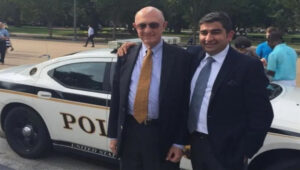
While Korkmaz was making these remarks in an interview aimed at a Turkish audience, as part of his efforts to rehabilitate his tarnished reputation amid ongoing legal troubles in the US and Turkey, he was telling a completely different story to his convicted associates while orchestrating a fraudulent scheme to defraud US taxpayers and the Kingston brothers.
In conversations with the Kingston brothers and Termendzhyan, Korkmaz frequently boasted about his connections with high-ranking US government officials, referring to Woolsey as “Grandpa” and Woolsey’s late wife, Nancye, as “Grandma.”
According to 2023 court testimony in a Utah federal court, Jacob Kingston, who reached a plea deal with prosecutors, admitted to laundering approximately $140 million stolen from the US Treasury in Turkey with Korkmaz’s assistance. He claimed that some of this money was potentially sent to Kurdish groups fighting against the Islamic State in Iraq and Syria (ISIS) as part of a covert CIA operation in Turkey.
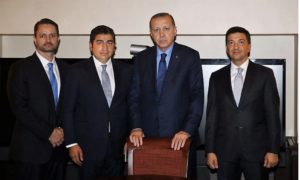
According to prosecutors, Korkmaz assisted the gang in acquiring luxury homes and assets, including the Mardan Palace hotel, businesses such as Biofarma and the Turkish airline Borajet, a 40-foot luxury yacht named the Queen Anne, a hotel in Turkey and a villa and apartment along the Bosporus in Istanbul.
Marc Agnifilo, Kingston’s attorney, said his client believed “some of it, not all, was sanctioned by the US government and the CIA, with money going to business entities in Turkey to fund the CIA and support the US’s Kurdish allies against ISIS.” He added, “There is so much backstory.”
The lawyer echoed Kingston’s statements from his 2018 trial, where Kingston testified that he had wired $6 million to Korkmaz, believing it would leverage Woolsey’s connections. Kingston received a series of texts from Korkmaz promising protection from the grand jury investigation and other legal troubles, allegedly through the influence of a sympathetic judge.
It appears that Korkmaz not only laundered money on behalf of the Kingston brothers but also deceived them by requesting funds under the pretense of securing protection from US law enforcement.
Text messages exchanged between Kingston and Korkmaz, who was soliciting money, were presented as evidence in court. In one message dated June 12, 2018, Korkmaz wrote, “The judge is a good guy. He will not disappoint the grandpa.” On June 14, 2018, he wrote again, “The grandfather called now. It has to be done in 5 days. Last chance.”
The arrest warrant for Sezgin Baran Korkmaz was executed on July 15, 2022:
Isaiah Kingston, who was also convicted for his role in the biodiesel scheme, corroborated this account. He testified that Korkmaz frequently boasted about his powerful connections, reaching the highest levels. Kingston recalled Korkmaz describing associates in the CIA who could “walk right up to somebody and prick them with a poison ring, and it would kill them.”
The veracity of Korkmaz’s claims remains uncertain, given his history of habitual lying, including during an interview with federal investigators who cautioned him about the consequences of lying to law enforcement and the potential charges for obstruction.
Korkmaz employed a similar narrative of having powerful connections when discussing his ties to higher-ups in the Turkish government. In a recent interview he claimed to maintain an extensive intelligence network in Turkey, asserting that he was well-informed about his business dealings and legal troubles, including knowing what was happening and who was involved.
The Kingston brothers and Termendzhyan made nearly a dozen trips to Turkey, where Korkmaz introduced them to President Erdogan as major investors and arranged for them to have police escorts. According to US federal prosecutors, they were preparing to relocate to Turkey in anticipation of potential legal troubles in the US Jacob Kingston even began learning Turkish with a private tutor, brought his wife Sally and some of his children to Turkey and toured on the luxury yacht Queen Anne, which Korkmaz had purchased with stolen US taxpayer money.
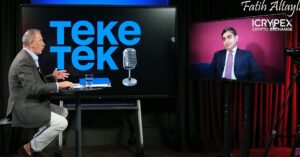
In the interview, Korkmaz discussed the yacht, boasting about how he transformed it from a neglected vessel gathering dust in a Turkish port into a lucrative asset. He recounted discovering the yacht in Turkey’s free trade zone in the Mediterranean resort province of Antalya and initiating inquiries about its status. The yacht was taken over by a Slovenian company after a series of issues with the yacht’s builder and financier. Korkmaz claimed to have purchased the yacht for $2 million. After resolving various complications, including repairs and certifications, he successfully put it back into service.
However, the US seized the yacht in Beirut while Korkmaz was attempting to sell it for a significantly higher price, following the arrest and imprisonment of his co-conspirators in the US. Korkmaz claimed the yacht’s market value was approximately $20 million. He stated that the US government sold the yacht with his consent and deducted the sale price from his debt to the US, which was reported to be between $135 million and $140 million.
In a statement issued by the US Justice Department in July 2022, it was noted that the US Marshals Service, in cooperation with Lebanese authorities, took possession of the yacht in July 2021 and sold it in early 2022 for $10.11 million, part of a judgment issued by US District Judge Jill Parrish of the District of Utah, who is presiding over the Korkmaz case.
In the interview, Korkmaz claimed he was unaware of Termendzhyan’s criminal background and had no knowledge of the Kingston brothers’ theft of US Treasury funds. However, the indictment against Korkmaz lists numerous lies he told federal investigators to conceal his dealings with the Kingston brothers and Termendzhyan.
During the trial US prosecutors argued that the Kingston brothers and Termendzhyan were not only using Turkey for money laundering but also viewed it as a potential refuge if their legal troubles in the US escalated.
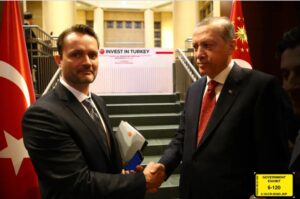
The prosecutors’ concerns proved accurate. On August 23, 2018, when the IRS launched simultaneous operations, agents apprehended Jacob Kingston as he was about to board a plane to Istanbul at Salt Lake City International Airport. His wife Sally and two of his sons were also at the airport, in a separate location and in disguise. Termendzhyan, who had just returned from a trip to Turkey, was arrested on the same day while preparing to meet with federal authorities.
While his associates were incarcerated in Utah, Korkmaz, shielded from US law in Turkey and seemingly protected by the Erdogan government, remained at large. He continued to generate wealth by acquiring distressed firms through transactions deemed highly controversial. Korkmaz was reportedly supported by senior government officials in his business endeavors and received protection from influential figures in the judiciary and law enforcement agencies.
Korkmaz was appearing in the Turkish media, portraying himself as a philanthropist and successful businessman who had rapidly ascended the corporate ladder despite his origins in the impoverished province of Kars in northeastern Turkey. He also attempted to gain political favor and curry favor with the US government by inserting himself into the high-profile case of US pastor Andrew Brunson, who had been wrongfully arrested by the Erdogan government on what appeared to be fabricated charges of spying and terrorism.
Korkmaz orchestrated a scheme involving Woolsey’s wife, Nancye Miller, who was then a registered lobbyist for Turkey, to bring her husband, former CIA director Woolsey, along with Donald Trump fundraiser Tommy Hicks Jr., to Turkey to advocate for the pastor’s release. They traveled on a plane owned by Borajet, an airline company Korkmaz had purchased with illicit proceeds from the Kingston brothers’ biodiesel fraud. Although Miller was unable to join the trip due to illness, she remained behind, working the phones and maintaining communication with Erdogan’s office.
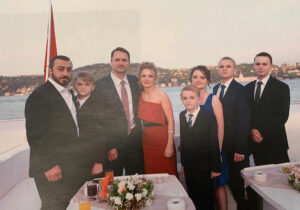
It is unclear whether the trip had any direct impact on securing the pastor’s release a month later. However, it is likely that the increasing pressure from the Trump administration, including threats to damage the Turkish economy and sanctions against top Turkish officials, played a significant role in persuading President Erdogan to abandon his hostage policy and release the pastor.
Despite his efforts to claim credit, Korkmaz faced resistance. According to an interview with the pastor’s Turkish lawyer, Ismail Cem Halavurt, conducted by the investigative journalism platform OCCRP, Korkmaz called the lawyer, asking him to publicly acknowledge Korkmaz’s role in securing Brunson’s release. The lawyer, who had never heard of Korkmaz before the call, declined the request. Nevertheless, Korkmaz still appeared alongside the lawyer when Brunson was freed.
Korkmaz remained untouchable in Turkey until he apparently became a liability to President Erdogan, who was already grappling with the fallout from a case involving Turkish-Iranian businessman Reza Zarrab. Erdogan reportedly perceived Korkmaz as an increasing risk and eventually decided to cut his losses, allowing Korkmaz to face the consequences.
The Zarrab case highlights how the Erdogan government operates in similar high-profile scandals. The Turkish-Iranian businessman forged close ties with senior Turkish officials, including Erdogan himself, while orchestrating a money laundering and sanctions-busting scheme on behalf of Iran, utilizing Turkish state banks.
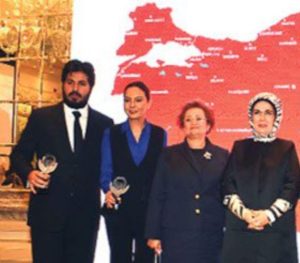
Zarrab was arrested in Turkey in December 2013 after prosecutors discovered that he had bribed senior government officials, including cabinet ministers, and cultivated personal ties with Erdogan, all while violating multiple Turkish laws. Erdogan, implicated in the investigation, intervened to obstruct the prosecution by orchestrating the removal of the lead prosecutors and investigators. Zarrab was subsequently acquitted by new judges appointed by the Erdogan government, despite the overwhelming evidence of his criminal activities.
However, Zarrab was arrested by the FBI in Miami in 2016 and charged by the US Attorney for the Southern District of New York with engaging in hundreds of millions of dollars’ worth of transactions on behalf of the Iranian government, as well as money laundering and bank fraud. President Erdogan attempted to secure Zarrab’s release by lobbying US government officials and sending official diplomatic notices on his behalf.
However, Erdogan’s efforts did not succeed as planned. Zarrab struck a plea deal with prosecutors and cooperated in a US federal case, revealing that Erdogan had instructed Turkish state banks to participate in the multi-billion dollar scheme in exchange for kickbacks. In response, new criminal cases were launched against Zarrab and his associates in Turkey, seemingly intended to intimidate him and prevent further disclosures about the Erdogan government’s involvement.
Fearing that Korkmaz might become another Zarrab, the Erdogan government initiated criminal charges against him in a secret operation. This was officially confirmed by then-Turkish interior minister Süleyman Soylu on November 22, 2021 during a session in the Turkish Parliament. Describing the US federal case against Korkmaz as an “international operation against Turkey,” Soylu said, “We made a decision with the involvement of all the institutions of the [Turkish] state from top to bottom … and we thwarted the US [efforts] and exposed those who plotted against us.”
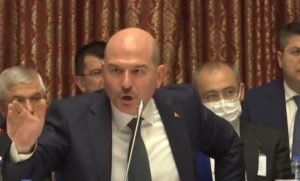
Korkmaz’s arrest in Austria triggered alarm bells for the Erdogan government, reminiscent of the reaction to Zarrab’s arrest in Miami. The Turkish government promptly requested his extradition on charges that had been filed against him in Turkey after he fell out of favor with the Erdogan regime. However, Austria decided to extradite Korkmaz to the US instead of Turkey. Since then, there have been numerous rumors suggesting that Korkmaz might reveal compromising details about his dealings with the Erdogan government and senior officials, similar to what Zarrab did.
In the interview, Korkmaz repeatedly asserted that he was not another Zarrab and had not betrayed the Erdogan government, hoping to return to Turkey and resume his business ventures. “No matter what happens or what I face, I will never allow people to say, ‘He will become the second Reza Zarrab,’ with satisfaction dripping from their mouths,” Korkmaz vowed. “I will not let people experience that happiness.”
Expressing frustration over a negative campaign launched against him while he was imprisoned in Austria and awaiting extradition and trial in the US, Korkmaz claimed that his name was unfairly associated with the Zarrab case and President Erdogan. He asserted that these associations were lies. “The Turkish state was not involved in my [US federal] case at all. None of these [claims] were true,” he said, adding that the fabrication of lies was an attempt to tarnish President Erdogan’s reputation through him, merely because he had a photo with the president.
When asked how he supported himself in the US, Korkmaz said he was engaged in new business ventures in distressed asset management, earning substantial income and anticipating a significant comeback. He did not disclose his total assets or earnings to avoid drawing the attention of the IRS, fearing that revealing his wealth might lead to further scrutiny.
According to court documents, the US attorneys litigating the case estimate that Korkmaz still controls approximately $100 million of the $133 million in fraud proceeds which were originally sent to financial accounts that Korkmaz controlled in Luxembourg and Turkey.
Korkmaz was convicted in Turkey and sentenced to 70 months in prison in what he claims was a politically motivated case. He expressed frustration that his bank accounts in Turkey had been closed but noted that he could still conduct business transactions and use credit cards issued by US banks with relative ease. Korkmaz said he plans to return to Turkey as soon as his federal case in Utah is concluded.
Korkmaz was released from prison in Utah in July 2023 while awaiting trial, which is now scheduled to resume in November after several delays.

